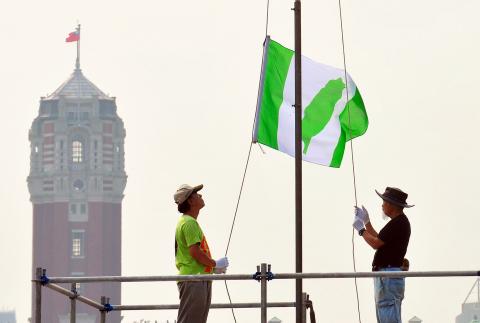|
WIKILEAKS: China
using ECFA to push unification
NOT ON THE MONEY: A Chinese official accused Ma
Ying-jeou of not doing a good job of ‘handling the economy,’ which had led to
opposition to the ECFA
By Mo Yan-chih / Staff Reporter

Pro-independence advocates hoist
a flag during a rally near the Presidential Office in Taipei yesterday.
Pro-independence groups have accused President Ma Ying-jeou of compromising
Taiwan’s sovereignty in exchange for economic benefits from Beijing, a claim
that has been categorically denied by Ma.
Photo: Patrick Lin, AFP
Following repeated pledges by President Ma
Ying-jeou (馬英九) that there would be no political ramifications to the Economic
Cooperation Framework Agreement (ECFA) with China, US diplomatic cables released
by WikiLeaks show that Beijing intends to use deepening economic relations with
Taiwan as a means to start political negotiations.
In a cable dated Jan. 6 last year from the US embassy in Beijing, Association
for Relations Across the Taiwan Straits (ARATS) Vice Secretary-General Ma
Xiaoguang (馬曉光), who had just concluded the fourth round of ECFA talks with the
Straits Exchange Foundation in Taichung, said during a meeting with the US
acting deputy chief of mission, Robert Goldberg, on Dec. 29, 2009, that
deepening economic relations would “inevitably lead to more complicated
political issues.”
Ma Xiaoguang said Beijing would like to start political negotiations with the Ma
Ying-jeou administration “at an early stage,” but that it would not promote
talks against his will, as he had been “forced” to push less actively for
political talks with Beijing since his inauguration.
“Beijing wants to engage Taiwan in political discussions, but will respect
President Ma’s unwillingness to do so at the current time. Nonetheless,
deepening economic discussions will ‘inevitably’ lead to political exchanges,”
the cable quoted him as saying.
The comments by the ARATS official confirmed Beijing’s attempt to engage in
political dialogue with the Ma administration as the Democratic Progressive
Party has warned.
The president and the Chinese Nationalist Party (KMT) have brushed aside such
concerns, stressing the economic pact signed with Beijing last year and
cross-strait talks focused on economic exchanges, saying the president would not
start a political dialogue with Beijing during his first term in office.
In the cable, Ma Xiaoguang said China “realized” that “even the rapid growth of
economic ties will not lead to unification naturally,” but added that China
would work to strengthen the basis for political negotiations under the
so-called “1992 consensus.”
He also criticized Ma Ying-jeou for not doing a good job of “handling the
economy” and attributed opposition to the ECFA in Taiwan to the president’s
“inability” to handle economic issues.
In another cable dated June 1, 2007, Ma Ying-jeou, who was then the KMT
presidential nominee, discussed the party’s stance on unification with
then-American Institute in Taiwan (AIT) director Stephen Young. He said the
KMT’s move to revise its charter did not mean it intended to abandon its goal of
unification.
In the meeting with Young, Ma Ying-jeou, accompanied by his top adviser, then-KMT
legislator Su Chi (蘇起), said on May 31, 2007, that changes to the KMT charter to
emphasize “Taiwan-centered values” would not alter the party’s original goal of
“national unification.”
The revision is aimed at broadening the appeal of the KMT to those who identify
themselves as Taiwanese, he said.
Discussing his experience in handling cross-strait affairs with Beijing, Ma
Ying-jeou described the Chinese government as one of “arrogance” and
“inflexibility,” telling Young that he did not expect special treatment from
Beijing if he was elected president.
|
![]()
![]()
![]()